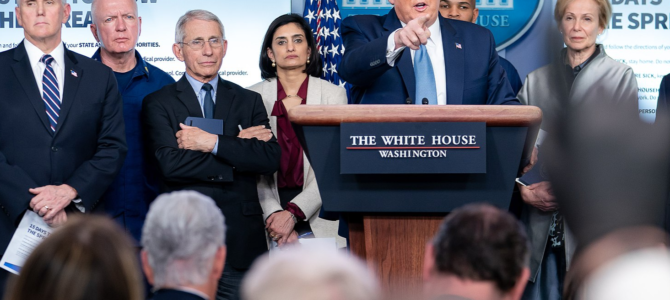
Crises have a way of revealing critical, unspoken truths. If we can recognize these truths, we can emerge from such crises significantly stronger. While America’s first priority in the wake of the Wuhan coronavirus crisis must be neutralizing immediate threats to the health and safety of our people, the disruption of our lives also provides an opportunity to engage in national reflection.
If we do so, amid the pandemic hysteria, several critical signals emerge. Acknowledging those signals today and internalizing them tomorrow can help us prevent, or be better positioned to handle, such Black Swan shocks to our system in the years ahead.
1. Communist China Is a Global Menace
When the Wuhan coronavirus pandemic arose and began spreading, for weeks the Chinese Communist Party (CCP) sought to cover it up, with deadly consequences for the world. When communist China was blamed, it not only refused to take responsibility, but slandered America for pointing the finger, to the point of calling the United States culpable as part of a disinformation campaign.
The CCP even threatened, via a state-backed publication, to cut off essential medical supplies should Americans continue speaking openly and honestly about the CCP’s role in creating the crisis. Then the CCP cynically tried to act as a savior for the crisis it created.
Every day this pandemic persists, and long after it is neutralized, we must remember the CCP bears by far the greatest responsibility of any party for this pandemic. If the CCP is not made to pay in a meaningful sense for the global catastrophe it caused, it will continue to act with impunity in its quest for hegemony, guaranteed.
This pandemic should represent the most tangible sign yet for all of America that we must decouple from communist China in every strategically significant sector. We cannot put our survival in the hands of a hostile adversary.
2. Coronavirus Starkly Illustrates Globalism’s Downsides
The Chinese coronavirus pandemic should serve as a figurative punch in the mouth to the Davoisie class. This pandemic spread as a result of human-to-human transmission beginning in a far-flung province in central China. As it metastasized, the World Health Organization (WHO), the United Nations-based agency on which governments around the world rely, parroted the Chinese Communist Party’s chosen narratives, including that the Wuhan virus could not be passed from one human to another, and that it was “racist” to refer to the virus by its place of origin.
The chief praiser of China’s response, and propagator of its favored messages, was WHO Director-General Tedros Adhanom Ghebreyesus. He won that position with Chinese backing and collaborated with China as Ethiopia’s health minister.
As the pandemic spread to the United States and criticism of the CCP grew, China again threatened to leverage its dominant position in the production of essential medical supplies to cut off Americans from vital equipment. It signaled that either we tow the CCP line or people will die.
This series of events perfectly illustrates the downsides to the globalist agenda of open borders, global political institutions, and global economic integration at all costs. It perfectly illustrates the merits of an America First, nationalist agenda, including a focus on border control, national sovereignty, and eschewing of global institutions, as well as an economic independence combined with truly free, fair, and reciprocal trade. Does anyone believe America would have been hit as hard by coronavirus if China were not so deeply integrated into our architecture?
3. We Must Establish Principles for Dealing with Crises
As a society, we must create some agreed-upon principles for dealing with a pandemic or analogous crisis. One of the most astounding aspects of the response to the Wuhan coronavirus pandemic has been the willingness of our leaders to call for societal shutdown based on shoddy data and flawed source models. Those leaders have definitively damaged our economy, stretched the limits of constitutional governmental power, and threatened to inflame and endanger civil society by forcing people to comply with draconian lockdowns while releasing criminals into the streets and ceasing policing — all on the basis of hypotheticals.
One need not be a medical doctor to understand the “garbage in, garbage out” issues inherent to projections in which the underlying data sets are incomplete, inconsistent, suffer from selection bias and correlation-versus-causation issues, or are just plain dubious — as in the case of data from China.
It is not surprising that politicians would err to the extreme side in seeking to avoid a public health catastrophe. But can a society long function by cutting off its nose to spite its face? And what kind of precedent is being set in the process? Going forward, it is incumbent upon our leaders to articulate and codify at minimum a general set of broadly agreed-upon principles for dealing with such crises.
4. The GOP Needs a Real Response for Democrats’ Games
For Democrats, politics trumps all else, and Republicans must have a response. In case the Brett Kavanaugh confirmation process or the more than three years of anti-constitutional and unconstitutional resistance to President Donald Trump did not make it crystal clear, the Democrats’ brazen gambit to use the coronavirus crisis to impose their radical agenda on the country by holding hostage emergency relief legislation should have removed all doubt about their singular desire for power.
Simply put, for Democrats, the ends justify any and all means. The fact that Republicans were so blindsided and befuddled by this in the coronavirus context indicates the GOP still lacks an understanding of the nature of their political adversary.
Democrats will shamelessly use crises to cram their policies down our throats. Do Republicans have any answer to this? Do they understand that Democrats will seek to make any and all of their favored temporary measures that pass in coronavirus-tied legislation permanent after the crisis subsides? Have Republicans formulated a counter-response not only for that possibility, but for their own policies that cut in the opposite direction? Where is the GOP counter-agenda?
5. We Need to Get Our Fiscal House in Order
While a society-wide shutdown certainly represents the most extreme kind of financial shock, nevertheless, the devastating impact of the Chinese coronavirus pandemic accentuates the problem of our largely debt-based economy in both the public and private spheres.
At the governmental level, the fact that we are likely to completely blow out budgets that were already so bloated as to ensure interest payments on the national debt would soon swamp all spending besides entitlements shows the extent of our profligacy and misplaced confidence we can debt-finance the U.S. government forever. There appears to be zero national will to deal with runaway spending and the runaway deficits and debt it creates.
But the reality is that in the next major crisis, we will be in an even worse financial position. What will happen if multitrillion-dollar relief bills are simply not tenable at that point?
Everyone knows U.S. government spending is unsustainable. But the fact that no one is prepared to make the case to the public that we are better off making difficult financial trade-offs now to stop calamity later — while we are doing this precise thing in dealing with the pandemic — leads to the question: Are we simply comfortable as a nation guaranteeing future financial calamity? Should the cost and extent of this crisis not cause us to revisit this issue?
We find an analogous issue in the private sector. While the bailouts from the federal government fundamentally differ from those during the financial crisis — in this instance, government has effectively killed businesses — that in a humming system so few businesses could withstand such a shock indicates the problems again with our debt-based economy and short-term orientation.
There is likely little will among businesses, their shareholders, and their stakeholders to be more prudent, keeping substantial cash in reserve, and ensuring they can survive if their operations withstand a tremendous hit and capital markets are closed to them. But perhaps the Wuhan coronavirus should serve as a wakeup call that there ought to be. Prudence is as important for government and businesses as it is for households.
It is paramount that the American people get healthy and that our country gets back to the business of business. But we must not simply gloss over the truths this crisis has revealed. Recognizing them and incorporating them into future policies will ensure the long-term vitality of our country.









